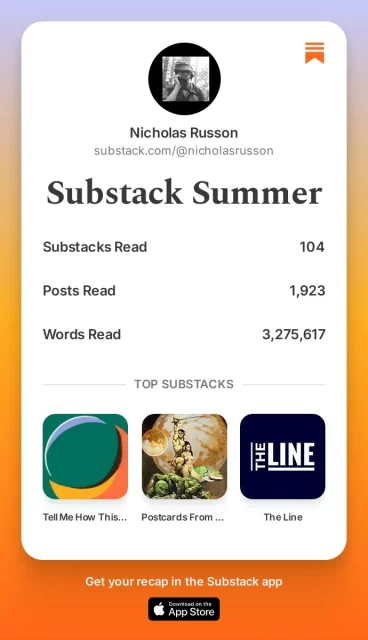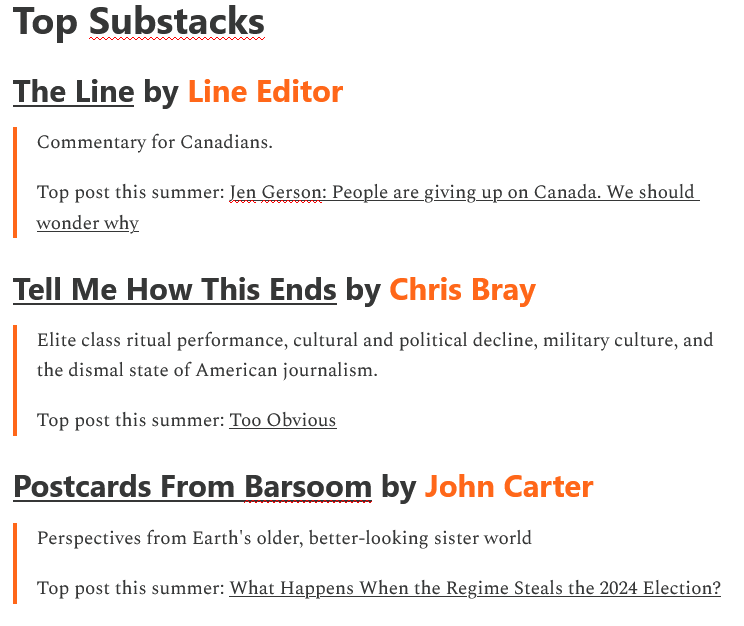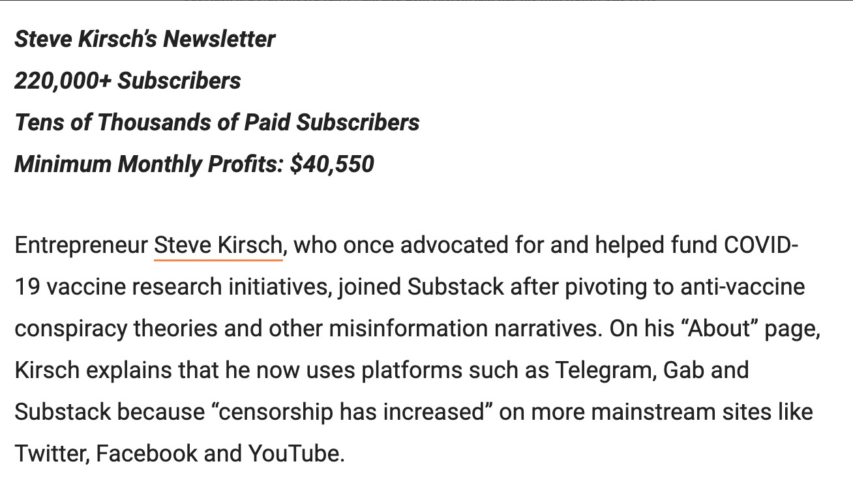His time is more limited, and his time off — he does the taxes for all the family businesses and I’m not the only one with three — usually ends up being spent researching HIS obsessions, like music or some obscure movie thing that fascinated him for no reason I can figure out, or something about early 20th century history.
But he definitely never hung out on political blogs. Which means when I’m trying to explain why something is immediately obvious — like, DIL in training doesn’t like to eat sandwiches, so I immediately said “But you’ll still make them for my son, right? Otherwise, it’s just unnatural” three of us laughed and my husband looked confused. Because “women as sandwich makers” was not part of his mental archive. And then I had to explain how it started in the blog fights of the early oughts — I end up, more often than not having to get galoshes and a spade and go digging, until he gets how we got here.
And then I suddenly feel a weird sympathy for the left and their absolute belief we use “dog whistles” and are in the middle of some form of conspiracy.
It’s not just that they can’t meme, or are humorless (though dear Lord, that’s part of it) but the inherent structure of politics in this country — and parts of the world, though they’re behind us by a few decades — makes the two sides very different in how they communicate.
The left STILL commands all the traditional communication channels. And because they are and assume they are the “accepted” mode of being in the culture — because they have the cultural megaphones from media to education, from government mechanisms (even when nominally not) to entertainment — they communicate in the open. They just slap their “I support thing” as virtue signaling over everything, plus some. They — and this is partly personality attracted to the side — seem to change their programming over night and all talk about “new thing” in unison.
This means their mode of communication is detached from reality (often) and rests on shaky ideological/economic foundations but it’s out in the open and blared from a megaphone.
They make jokes that aren’t jokes, merely pointing out they support the thing. And they say things they think will shock the right, but they have no clue what the right is or what would shock us.
They are in a way the young girl just released from a convent school trying to shock the kids in public school. They get weird looks. We understand them, but they don’t get us at all.
Meanwhile the right comes from years of silence. Years of being silenced, and not even being able to explain it to anyone. If I had a dime for every time I told someone in the nineties or oughts “yeah, most bestsellers are left because the right ones who are known to be so are stopped early” and got back “Nah, the left is more creative, because they’re anti-establishment and blah blah blah.” (HOW the left, in control of everything, is supposed to be anti-establishment is a good question. I mean, sure, they do a lot of things they think are shocking, but wouldn’t shock anyone who wasn’t born in my grandparent’s generation. Look, people, naked Shakespeare was OLD HAT when I was a kid in the late sixties. Now extrapolate from that.)
At least now most people know — it took Twitter, I think — that the right was being hard-silenced.
Which means most people my age who are the oldsters of the “we talk back” generation came to our own conclusions and thought we were crazy to dissent from what “everyone knew” for the longest time. No, really. We were out there, thinking we were along, but we could see no other way to make sense of things, so we stood. Alone, we thought.
A lot of my generation discovered they weren’t UTTERLY alone due to Rush Limbaugh. (I was never a big listener. I just am not. I don’t listen to podcasts, except maybe once a week. Even the audio books I listen to are usually things I already read. I don’t hear very well, and need to be sure I can “catch” what’s said, even if I miss some words.)
And most of us hit the nascent right blogosphere with two feet in the early oughts. Which is where a lot of the early memes like the “girls make sandwiches” meme comes from.
But the blogs, and particularly the blog comments, being a wild west type of atmosphere, where people who developed their opinions in isolation came together and figured out how it all fit for the first time, is a completely different form of communication from the top down, revealed truth talk on the left.
On the right, the clash between right feminist and right not particularly enthralled with feminism gave rise to “Make me a sandwich and get me a beer” as response to screeds on how you’re disrespecting some feminist shibboleth. (Particularly when women on the right hadn’t fully realized how much of the feminist “current thing” was really Marxism in a cute scarf and high heels.) And from that it got meme-fied into short hand, so you could drop a picture of an early 20th century mesmerist levitating a girl and label it “And like that this sandwich maker becomes an ironing board” and it was immediately funny, both poking fun at feminist outrage and the troglodytes or pseudo troglodytes (I’ve been known to be one of those) on our side who think women are inherently house-keepers. (And a lot of this is self-conscious mocking of the person by him/herself.)
We had to develop a sense of humor about our internal battles, including our own opinions, and we had to be able to communicate we weren’t ossified in our opinions really quickly, to prevent minor disagreements becoming blog or alliance shattering wars.
A lot of memes come from that. Because they can communicate “Yeah, this is what I think, kind of, but I’m aware it’s also funny.” Or “This is how I see your opinion. Care to clarify” in — usually — a non-offensive, quick-hit manner. A manner that allows the other person to come back with “Yabut–” Or “Funny, but in fact–”
The left doesn’t do that, because no scrapping allowed in the ranks. They value unity and directives come from above.
Beyond giving them a tragic inability to meme (Seriously, we should start a fund to send them to meme school) it also leaves them with the conviction that the right is always speaking in “dog whistles” or “code” and that we’re plotting horrible and scarifying violence against them, in these bizarre coded words.
 I subscribe to a lot of other folks’ Substack blogs and I’ve been linking to a lot of posts there over the last year or so. It’s a very good site and you’re bound to find things of interest there if you like some of the things I’ve been linking to.
I subscribe to a lot of other folks’ Substack blogs and I’ve been linking to a lot of posts there over the last year or so. It’s a very good site and you’re bound to find things of interest there if you like some of the things I’ve been linking to.















